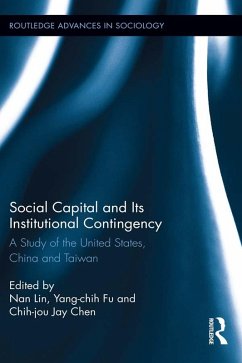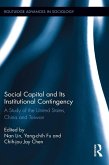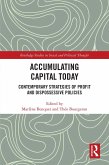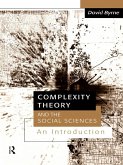Social Capital and Its Institutional Contingency (eBook, ePUB)
A Study of the United States, China and Taiwan
Redaktion: Lin, Nan; Chen, Chih-Jou Jay; Fu, Yang-Chih
44,95 €
44,95 €
inkl. MwSt.
Sofort per Download lieferbar

22 °P sammeln
44,95 €
Als Download kaufen

44,95 €
inkl. MwSt.
Sofort per Download lieferbar

22 °P sammeln
Jetzt verschenken
Alle Infos zum eBook verschenken
44,95 €
inkl. MwSt.
Sofort per Download lieferbar
Alle Infos zum eBook verschenken

22 °P sammeln
Social Capital and Its Institutional Contingency (eBook, ePUB)
A Study of the United States, China and Taiwan
Redaktion: Lin, Nan; Chen, Chih-Jou Jay; Fu, Yang-Chih
- Format: ePub
- Merkliste
- Auf die Merkliste
- Bewerten Bewerten
- Teilen
- Produkt teilen
- Produkterinnerung
- Produkterinnerung

Bitte loggen Sie sich zunächst in Ihr Kundenkonto ein oder registrieren Sie sich bei
bücher.de, um das eBook-Abo tolino select nutzen zu können.
Hier können Sie sich einloggen
Hier können Sie sich einloggen
Sie sind bereits eingeloggt. Klicken Sie auf 2. tolino select Abo, um fortzufahren.

Bitte loggen Sie sich zunächst in Ihr Kundenkonto ein oder registrieren Sie sich bei bücher.de, um das eBook-Abo tolino select nutzen zu können.
This volume is a collection of original studies based on one of the first research programs on comparative analysis of social capital. Data are drawn from national representative samples of the United States, China and Taiwan. The three societies selected for study allow the examination of how political-economic regimes (command versus market) and cultural factors (family centrality versus diverse social ties) affect the characteristics of social ties and social networks from which resources are accessed and mobilized.
- Geräte: eReader
- mit Kopierschutz
- eBook Hilfe
- Größe: 6.35MB
Andere Kunden interessierten sich auch für
![Social Capital and Its Institutional Contingency (eBook, PDF) Social Capital and Its Institutional Contingency (eBook, PDF)]() Social Capital and Its Institutional Contingency (eBook, PDF)44,95 €
Social Capital and Its Institutional Contingency (eBook, PDF)44,95 €![Schools, Space and Culinary Capital (eBook, ePUB) Schools, Space and Culinary Capital (eBook, ePUB)]() Gurpinder Singh LalliSchools, Space and Culinary Capital (eBook, ePUB)42,95 €
Gurpinder Singh LalliSchools, Space and Culinary Capital (eBook, ePUB)42,95 €![Logics of Critical Explanation in Social and Political Theory (eBook, ePUB) Logics of Critical Explanation in Social and Political Theory (eBook, ePUB)]() Jason GlynosLogics of Critical Explanation in Social and Political Theory (eBook, ePUB)46,95 €
Jason GlynosLogics of Critical Explanation in Social and Political Theory (eBook, ePUB)46,95 €![The Institutional Dynamics of Culture, Volumes I and II (eBook, ePUB) The Institutional Dynamics of Culture, Volumes I and II (eBook, ePUB)]() Perri SixThe Institutional Dynamics of Culture, Volumes I and II (eBook, ePUB)418,95 €
Perri SixThe Institutional Dynamics of Culture, Volumes I and II (eBook, ePUB)418,95 €![Accumulating Capital Today (eBook, ePUB) Accumulating Capital Today (eBook, ePUB)]() Accumulating Capital Today (eBook, ePUB)42,95 €
Accumulating Capital Today (eBook, ePUB)42,95 €![Complexity Theory and the Social Sciences (eBook, ePUB) Complexity Theory and the Social Sciences (eBook, ePUB)]() David ByrneComplexity Theory and the Social Sciences (eBook, ePUB)50,95 €
David ByrneComplexity Theory and the Social Sciences (eBook, ePUB)50,95 €![Contexts of Social Capital (eBook, ePUB) Contexts of Social Capital (eBook, ePUB)]() Contexts of Social Capital (eBook, ePUB)48,95 €
Contexts of Social Capital (eBook, ePUB)48,95 €-
-
-
This volume is a collection of original studies based on one of the first research programs on comparative analysis of social capital. Data are drawn from national representative samples of the United States, China and Taiwan. The three societies selected for study allow the examination of how political-economic regimes (command versus market) and cultural factors (family centrality versus diverse social ties) affect the characteristics of social ties and social networks from which resources are accessed and mobilized.
Dieser Download kann aus rechtlichen Gründen nur mit Rechnungsadresse in A, B, BG, CY, CZ, D, DK, EW, E, FIN, F, GR, HR, H, IRL, I, LT, L, LR, M, NL, PL, P, R, S, SLO, SK ausgeliefert werden.
Produktdetails
- Produktdetails
- Verlag: Taylor & Francis eBooks
- Seitenzahl: 450
- Erscheinungstermin: 12. November 2013
- Englisch
- ISBN-13: 9781135012328
- Artikelnr.: 40020341
- Verlag: Taylor & Francis eBooks
- Seitenzahl: 450
- Erscheinungstermin: 12. November 2013
- Englisch
- ISBN-13: 9781135012328
- Artikelnr.: 40020341
- Herstellerkennzeichnung Die Herstellerinformationen sind derzeit nicht verfügbar.
Nan Lin is Oscar L. Tang Professor Emeritus of Sociology, Duke University, and was Distinguished Research Fellow at Academia Sinica at the time of the reported research program. Yang-chih Fu is research fellow in the Institute of Sociology, Academia Sinica, Taiwan. Chih-Jou Jay Chen is Associate Research Fellow at the Institute of Sociology of Academia Sinica, a jointly appointed Associate Professor at the Institute of Sociology, National Tsing Hua University, and Director of the Center for Contemporary China, National Tsing Hua University.
Introduction 1. Social Capital in a Comparative Perspective Nan Lin,
Yang-chih Fu and Chih-jou Jay Chen Part I: Measuring Social Capital 2.
Contact Status and Finding a Job: Validation and Extension Nan Lin, Hang
Young Lee and Dan Ao 3. Homophily and Heterophily in the Position-Generated
Networks in the U.S. and China Dan Ao 4. Status-Based Differential Memory
and Measurement of Social Capital: Recall Errors and Bias Estimates
Kuo-Hsien Su and Nan Lin Part II: Endogeneity of Social Capital: Structural
and Network Features 5. Similarities and Differences in Relation-Specific
Social Resources Among Three Societies: Taiwan, China and the United States
Ray-May Hsung and Ronald L. Breiger 6. How Social Capital Changes During
One's Current Job: Work Conditions and Contact Patterns Yang-chih Fu, Ray
May Hsung and Szu-Ying Lee 7. Occupational Sex Composition, Cultural
Contexts, and Social Capital Formation: Cases of the United States and
Taiwan Wei-hsin Yu and Chi-Tsun Chiu 8. The Internet Implications for
Social Capital: Stock, Changes, and Tie Strength Wenhong Chen Part III:
Accessing and Mobilizing Social Capital: Institutional, Networking and
Organizational Factors 9. Job Search Chains and Embedded Resources: A
Comparative Analysis Among Taiwan, China and the US Chih-jou Jay Chen 10.
Network and Contact Diversities in Race and Gender and Status Attainment in
the United States Joonmo Son 11. The Road to Democracy: A Three-Society
Comparison of Civic Network Structures Yanlong Zhang and Hang Young Lee
Part IV: Social Capital and Well-Being 12. Social Capital in the Workplace
and Health Disruptions: A Cross-National Investigation Steve McDonald,
Feinian Chen and Martha Crowley 13. Bright and Dark Sides of Who You Know
in the Evaluation of Well-Being: Social Capital and Life Satisfaction
Across Three Societies Lijun Song Appendix I: Social Capital USA 2004
Telephone Interview Questionnaire. Appendix II: Sample Characters for U.S.,
Taiwan, and China 2004-2005 Social Capital Surveys.
Yang-chih Fu and Chih-jou Jay Chen Part I: Measuring Social Capital 2.
Contact Status and Finding a Job: Validation and Extension Nan Lin, Hang
Young Lee and Dan Ao 3. Homophily and Heterophily in the Position-Generated
Networks in the U.S. and China Dan Ao 4. Status-Based Differential Memory
and Measurement of Social Capital: Recall Errors and Bias Estimates
Kuo-Hsien Su and Nan Lin Part II: Endogeneity of Social Capital: Structural
and Network Features 5. Similarities and Differences in Relation-Specific
Social Resources Among Three Societies: Taiwan, China and the United States
Ray-May Hsung and Ronald L. Breiger 6. How Social Capital Changes During
One's Current Job: Work Conditions and Contact Patterns Yang-chih Fu, Ray
May Hsung and Szu-Ying Lee 7. Occupational Sex Composition, Cultural
Contexts, and Social Capital Formation: Cases of the United States and
Taiwan Wei-hsin Yu and Chi-Tsun Chiu 8. The Internet Implications for
Social Capital: Stock, Changes, and Tie Strength Wenhong Chen Part III:
Accessing and Mobilizing Social Capital: Institutional, Networking and
Organizational Factors 9. Job Search Chains and Embedded Resources: A
Comparative Analysis Among Taiwan, China and the US Chih-jou Jay Chen 10.
Network and Contact Diversities in Race and Gender and Status Attainment in
the United States Joonmo Son 11. The Road to Democracy: A Three-Society
Comparison of Civic Network Structures Yanlong Zhang and Hang Young Lee
Part IV: Social Capital and Well-Being 12. Social Capital in the Workplace
and Health Disruptions: A Cross-National Investigation Steve McDonald,
Feinian Chen and Martha Crowley 13. Bright and Dark Sides of Who You Know
in the Evaluation of Well-Being: Social Capital and Life Satisfaction
Across Three Societies Lijun Song Appendix I: Social Capital USA 2004
Telephone Interview Questionnaire. Appendix II: Sample Characters for U.S.,
Taiwan, and China 2004-2005 Social Capital Surveys.
Introduction 1. Social Capital in a Comparative Perspective Nan Lin,
Yang-chih Fu and Chih-jou Jay Chen Part I: Measuring Social Capital 2.
Contact Status and Finding a Job: Validation and Extension Nan Lin, Hang
Young Lee and Dan Ao 3. Homophily and Heterophily in the Position-Generated
Networks in the U.S. and China Dan Ao 4. Status-Based Differential Memory
and Measurement of Social Capital: Recall Errors and Bias Estimates
Kuo-Hsien Su and Nan Lin Part II: Endogeneity of Social Capital: Structural
and Network Features 5. Similarities and Differences in Relation-Specific
Social Resources Among Three Societies: Taiwan, China and the United States
Ray-May Hsung and Ronald L. Breiger 6. How Social Capital Changes During
One's Current Job: Work Conditions and Contact Patterns Yang-chih Fu, Ray
May Hsung and Szu-Ying Lee 7. Occupational Sex Composition, Cultural
Contexts, and Social Capital Formation: Cases of the United States and
Taiwan Wei-hsin Yu and Chi-Tsun Chiu 8. The Internet Implications for
Social Capital: Stock, Changes, and Tie Strength Wenhong Chen Part III:
Accessing and Mobilizing Social Capital: Institutional, Networking and
Organizational Factors 9. Job Search Chains and Embedded Resources: A
Comparative Analysis Among Taiwan, China and the US Chih-jou Jay Chen 10.
Network and Contact Diversities in Race and Gender and Status Attainment in
the United States Joonmo Son 11. The Road to Democracy: A Three-Society
Comparison of Civic Network Structures Yanlong Zhang and Hang Young Lee
Part IV: Social Capital and Well-Being 12. Social Capital in the Workplace
and Health Disruptions: A Cross-National Investigation Steve McDonald,
Feinian Chen and Martha Crowley 13. Bright and Dark Sides of Who You Know
in the Evaluation of Well-Being: Social Capital and Life Satisfaction
Across Three Societies Lijun Song Appendix I: Social Capital USA 2004
Telephone Interview Questionnaire. Appendix II: Sample Characters for U.S.,
Taiwan, and China 2004-2005 Social Capital Surveys.
Yang-chih Fu and Chih-jou Jay Chen Part I: Measuring Social Capital 2.
Contact Status and Finding a Job: Validation and Extension Nan Lin, Hang
Young Lee and Dan Ao 3. Homophily and Heterophily in the Position-Generated
Networks in the U.S. and China Dan Ao 4. Status-Based Differential Memory
and Measurement of Social Capital: Recall Errors and Bias Estimates
Kuo-Hsien Su and Nan Lin Part II: Endogeneity of Social Capital: Structural
and Network Features 5. Similarities and Differences in Relation-Specific
Social Resources Among Three Societies: Taiwan, China and the United States
Ray-May Hsung and Ronald L. Breiger 6. How Social Capital Changes During
One's Current Job: Work Conditions and Contact Patterns Yang-chih Fu, Ray
May Hsung and Szu-Ying Lee 7. Occupational Sex Composition, Cultural
Contexts, and Social Capital Formation: Cases of the United States and
Taiwan Wei-hsin Yu and Chi-Tsun Chiu 8. The Internet Implications for
Social Capital: Stock, Changes, and Tie Strength Wenhong Chen Part III:
Accessing and Mobilizing Social Capital: Institutional, Networking and
Organizational Factors 9. Job Search Chains and Embedded Resources: A
Comparative Analysis Among Taiwan, China and the US Chih-jou Jay Chen 10.
Network and Contact Diversities in Race and Gender and Status Attainment in
the United States Joonmo Son 11. The Road to Democracy: A Three-Society
Comparison of Civic Network Structures Yanlong Zhang and Hang Young Lee
Part IV: Social Capital and Well-Being 12. Social Capital in the Workplace
and Health Disruptions: A Cross-National Investigation Steve McDonald,
Feinian Chen and Martha Crowley 13. Bright and Dark Sides of Who You Know
in the Evaluation of Well-Being: Social Capital and Life Satisfaction
Across Three Societies Lijun Song Appendix I: Social Capital USA 2004
Telephone Interview Questionnaire. Appendix II: Sample Characters for U.S.,
Taiwan, and China 2004-2005 Social Capital Surveys.







